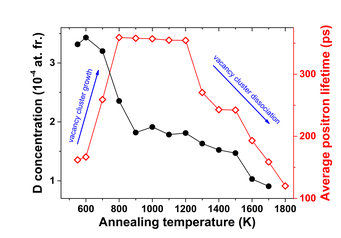The Influence of Radiation, Mechanical, and Plasma-Induced Damage on Deuterium Retention in Tungsten
The role of specific defects on deuterium retention in tungsten was clarified in dedicated laboratory experiments. Such information is important because hydrogen isotopes are retained in tungsten only by bonding to lattice defects and this finally determines tritium retention in plasma-facing components in fusion reactors.
Despite the large body of experimental and theoretical data, the hydrogen trapping characteristics of most types of crystal lattice defects in tungsten are still unclear. This issue was addressed in the PhD thesis of Mikhail Zibrov by examining specially prepared and well-characterized tungsten specimens having only one dominant defect type.

For the first time, the deuterium (D) binding energy to vacancies in tungsten was determined with high accuracy from a set of specifically designed thermal desorption measurements. The use of positron lifetime spectroscopy allowed identifying the characteristic temperatures of vacancy agglomeration into clusters and of dissociation of clusters of different sizes. Vacancy clusters were found to bind deuterium even stronger than single vacancies. It was also concluded that dislocations in tungsten are only shallow traps for deuterium .
Mikhail Zibrov received a joint PhD degree from Technical University of Munich and Ghent University in November 2018. The thesis is available under the following link: http://hdl.handle.net/21.11116/0000-0002-A14C-3
Furthermore, he was selected by EUROfusion as EU representative to participate in 2019-2020 in collaborative Experiments in the PISCES-B Facility at the University of California, San Diego (USA).
The work of Mikhail Zibrov was carried out within the framework of the International Doctoral College in Fusion Science and Engineering (FUSION-DC). The research was executed at IPP in close collaborations with Moscow Engineering Physics Institute, Bundeswehr University Munich, Belgian Nuclear Research Centre SCK•CEN, and Dutch Institute for Fundamental Energy Research.
Some of the results presented in the thesis have been already published as:
M. Zibrov, M. Balden, T.W. Morgan, M. Mayer, Deuterium trapping and surface modification of polycrystalline tungsten exposed to a high-flux plasma at high fluences, Nuclear Fusion 57 (2017) 046004. http://dx.doi.org/10.1088/1741-4326/aa5898
M. Zibrov, S. Ryabtsev, Yu. Gasparyan, A. Pisarev, Experimental determination of the deuterium binding energy with vacancies in tungsten, Journal of Nuclear Materials 477 (2016) 292. http://dx.doi.org/10.1016/j.jnucmat.2016.04.052
